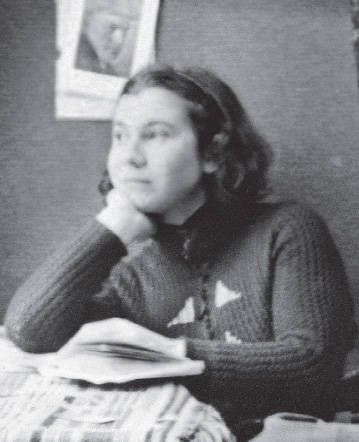PORTRAIT Etty Hillesum, Witness to the Holocaust
Not often can historians penetrate the inner worlds of the people they study. But in the letters and diary of Etty Hillesum, a young Dutch Jewish woman caught up in the Nazi occupation of her country during the early 1940s, we can catch a glimpse of her expanding interior life even as her external circumstances contracted sharply amid the unfolding of the Holocaust.16
Born in 1914, Etty was the daughter of a Dutch academic father and a Russian-born mother. She attended university, tutored students in the Russian language, and hoped to become a writer. The Nazi invasion of the Netherlands in May 1940 found Etty living in Amsterdam with five other people. There she experienced and described Nazi rule and its mounting impact on Jews. “More arrests, more terror, concentration camps; the arbitrary dragging off of fathers, sisters, brothers,” she wrote in June 1941. Soon Amsterdam’s Jews were required to wear identifying yellow stars and were forbidden from walking on certain streets, riding the tram, visiting particular shops, or eating in cafes. Signs reading “no admittance to Jews” sprang up across the city.

Etty initially reacted to these events with hatred and depression. She felt “beside myself with anger, cursing and swearing at the Germans,” and was even upset with a German woman living in her house who had no connections whatever with the Nazis. “They are out to destroy us completely,” she wrote on July 3, 1942. “Today I am filled with despair.” Over time, however, her perspective changed. “I really see no other solution than to turn inward and to root out all the rottenness there.” One day, with the “sound of fire, shooting, bombs” raging outside, Etty listened to a Bach recording and wrote: “I know and share the many sorrows a human being can experience, but I do not cling to them; they pass through me, like life itself, as a broad eternal stream . . . and life continues. . . . If you have given sorrow the space that its gentle origins demand, then you may say that life is beautiful and so rich . . . that it makes you want to believe in God.”
Meanwhile Etty had fallen deeply in love with her fifty-five-year-old German Jewish therapist, Julius Spier. She worried that she was becoming overly dependent on a man, particularly since she was already sleeping with another man in whose house she lived. Yet, Spier had become her spiritual companion and mentor as well as her lover. When he died in September 1942, she was devastated but determined to go on. “You were the mediator between God and me,” she wrote of Spier, “and now you have gone and my path leads straight to God.”
Eventually, Etty found herself in Westerbork, a transit camp for Dutch Jews awaiting transport to the east and almost certain death. Friends had offered to hide her, but Etty insisted on voluntarily entering the camp, where she operated as an unofficial social worker and sought to become the “thinking heart of the barracks.” In the camp, panic erupted regularly as new waves of Jews were transported east. Babies screamed as they were awakened to board the trains. “The misery here is really indescribable,” she wrote in mid-1943. “People live in those big barracks like so many rats in a sewer.”
Even there, however, Etty’s emerging inner life found expression. “Late at night . . . ,” she wrote, “I often walk with a spring in my step along the barbed wire. And then time and again, it soars straight from my heart . . . the feeling that life is glorious and magnificent and that one day we shall be building a whole new world. Against every new outrage and every fresh horror, we shall put up one more piece of love and goodness, drawing strength from within ourselves. We may suffer, but we must not succumb.”
Etty’s transport came on September 7, 1943, when she, her parents, and a brother boarded a train for Auschwitz. Her parents were gassed immediately upon arrival, and Etty followed on November 30. Her last known writing was a postcard tossed from the train as it departed Westerbork. It read in part: “I am sitting on my rucksack in the middle of full freight car. Father, mother, and Mischa [her brother] are a few cars behind. . . . We left the camp singing.”
Etty Hillesum’s public life, like that of most people, left little outward mark on the world she briefly inhabited, except for the small circle of her friends and family. But the record of her inner life, miraculously preserved, remains among the greatest spiritual testaments to emerge from the horrors of the Nazi era, a tribute to the possibilities of human transformation, even amid the most horrendous of circumstances.
Question
Questions: In what ways did Etty experience the Nazi phenomenon? How might you assess Etty’s interior response to the Nazis? Was it a “triumph of the human spirit” or an evasion of the responsibility to resist evil more directly?